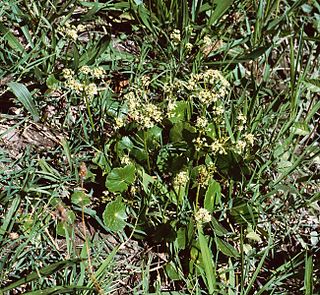
The dwarf bonneted bat, or Peters' mastiff bat,, is a bat species from South and Central America.

The blue-and-yellow tanager is a species of bird in the tanager family Thraupidae.

Verbena bonariensis, the purpletop vervain, clustertop vervain, Argentinian vervain, tall verbena or pretty verbena, is a member of the verbena family cultivated as a flowering annual or herbaceous perennial plant. In USA horticulture, it is also known by the ambiguous names purpletop and South American vervain. For the misapplication "Brazilian verbena" see below.

Hydrocotyle bonariensis, the largeleaf pennywort, once a member of the family Apiaceae, now in the family Araliaceae and of the genus Hydrocotyle, is a hairless and creeping perennial.
Anomiopus is a genus of scarab beetles in the family Scarabaeidae. There are more than 60 described species in Anomiopus, found in Central and South America.
Anomiopus ataenioides is a species of true dung beetle that is endemic to northern Argentina, and is known from Salta, Jujuy, Tucumán and Corrientes provinces. It is believed to share ant colony nests (myrmecophile).
Anomiopus birai is a species of true dung beetle that is known from Caaguazú and Concepción departments of Paraguay, and Mato Grosso do Sul and Mato Grosso states of Brazil. It is found in cerrado savanna at low altitudes, and is a myrmecophile.
Anomiopus caputipilus is a species of true dung beetle that is endemic to Goiás and Mato Grosso in Brazil. It occurs in cerrado above 700 m altitude. It may be a myrmecophile. It may be threatened by soy bean, cotton and sunflower plantations and cattle ranching.
Anomiopus idei is a species of true dung beetle that is endemic to Perú, and is only known from its type locality in Loreto Region.
Anomiopus lacordairei is a species of true dung beetle that is endemic to French Guiana, and is only known from Cayenne. It has been recorded from lowland forests, and it may be a myrmecophile.
Anomiopus laetus is a species of true dung beetle that is endemic to Brazil, and is known from Amazonas, Pará and Acre states. It may be a myrmecophile.
Anomiopus nigrocoeruleus is a species of true dung beetle that can be found in Argentina, Brazil and Paraguay. It can be found in cerrado and chaco biomes. It may be a myrmecophile.
Anomiopus parallelus is a species of true dung beetle that can be found in northern Brazil and French Guiana, and can be found in the Amazon and Cerrado biomes. It may be a myrmecophile.
Anomiopus pictus is a species of true dung beetle that can be found in Brazil and Perú. It may be a myrmecophile.
Anomiopus smaragdinus is a species of true dung beetle that can be found in Brazil, French Guiana, Venezuela and Bolivia. It may be a myrmecophile.
Anomiopus soledari is a species of true dung beetle that is endemic to Brazil, and can be found in the Federal District and Goiás State. It can be found in the cerrado biome, and may be a myrmecophile.
Anomiopus virescens is a species of true dung beetle that can be found in Bolivia, Brazil and Paraguay. It can be found in the cerrado biome and surrounding areas, and is likely to be nocturnal and a myrmecophile.
Anomiopus gracilis is a species of true dung beetle that can be found in Brazil and Venezuela.
Anomiopus howdeni is a species of true dung beetle that can be found in Brazil and French Guiana.

Odontesthes bonariensis is a species of Neotropical silverside, an euryhaline fish native to fresh, brackish and salt water in south-central and southeastern South America, but also introduced elsewhere. It is often known by the common name Argentinian silverside or pejerrey, but it is not the only species of silverside in Uruguay and Argentina and pejerrey is also used for many other silversides. It is a commercially important species and the target of major fisheries.





